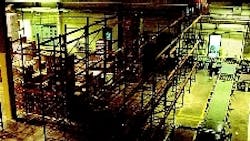Secret Sauce: ASRS Helps LiDestri Move 25 Million Cases a Year
LiDestri Foods, a family-owned, quarter-billion dollar manufacturing and packaging company, is on pace this year to produce and move 25 million cases of pasta sauces, salsa and specialty sauces under its own label and national brands like Newman's Own and Nestle.
LiDestri (Fairport, N.Y.) has the capacity to distribute a high volume of product because it worked with an integrator, Retrotech Inc. (Fishers, N.Y.), to expand and mechanize its warehouse in 1999. Two factors triggered the expansion:-increased customer demand and lack of space in its old 40,000 sq.-ft. warehouse to store, stage and ship product. Additionally, unit case cost was rising due to the expense of transporting and storing product at off-site warehouses.
The solution was to build a 70,000 sq.-ft. expansion and install an automatic storage/automated retrieval (ASRS) system, with a capacity of 16,000 pallets, based on technology from Activ Systems (Finland). The technology has the high density needed to consolidate LiDestri's more than 1,000 SKUs. The system also has the flexibility to accommodate changes in business practices.
LiDestri achieved the system's return on investment in less than 24 months. The company has enjoyed benefits not anticipated in the system's original justification, says Ed McGuire, LiDestri's vice president of operations. They include fewer damaged goods, reduced returns, and having finished goods close to the manufacturing facility.
LiDestri's 24/7 manufacturing process starts with just-intime delivery of glass containers that are immediately filled, labeled, packaged and palletized. Conveyors take the palletized finished goods to the warehouse for storage in the ASRS. The warehouse handles order fulfillment. When trucks come to the warehouse, the ASRS brings forward the correct load for that truck.
The ASRS combines hardware and a lot of software. It makes sure product is properly rotated and stored in a way that if one lane in the ASRS is blocked, the same product, SKU and code date can be retrieved from another location. The Activ software lets LiDestri set parameters for product turns. Unlike some automated storage/retrieval systems, the Activ software constantly moves product to different rack locations to better optimize where it is stored based on how fast the product turns and the shipment grouping size.
LiDestri's proprietary warehouse management system (WMS) connects its ERP to the Activ software. The WMS also lets the manufacturing floor communicate with the ASRS. Rules built into the integrated software make sure product are released on time. It is also a secure system. Product theft or counterfeit is prevented because the pallets are locked in the ASRS racks; the software is needed to retrieve it.
While the ASRS accepts pallet loads from the plant's three automated lines and one club-pack line for warehouse stores, it is building and presenting loads for shipment. The ASRS decides, based on other activities happening in its racks, which one of the order's loads can be retrieved and brought to the shipping lane with the least amount of moves. To keep the process at its peak efficiency, the ASRS is always looking for the best overall solution while it is staging 30 trucks and receiving more than 100 pallets an hour from manufacturing. At the shipping lanes, three lift truck drivers can load six trucks with 22 pallets per truck in an hour.
It took LiDestri a few months of operating to fine tune and debug the ASRS. "It takes some work and effort. You have to be ready for that," McGuire says. Today, the system's preventative maintenance and repair work takes about 40 man-hours per week. "If you do it right and stay on top of maintaining it, it is really a pretty simple unit to keep running well."
When individual products come out of production, palletized unit loads need to be built and stretch wrapped before being stored in LiDestri's ASRS system.
